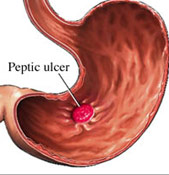Ulcerations
(sores)
in the
lining
of upper
part of
the
digestive
tract
are
known as
Peptic
Ulcers.
The
ulcers
may
exist in
the
lower
part of
food
pipe (oesophagus),
in the
stomach
or in
the
initial
part of
the
intestine
(duodenum).
About
10% of
all
adults
are
affected
with
Peptic
ulcers
at some
time in
their
life.
The
incidence
of
Peptic
ulcers
is more
common
in males
as
compared
to
females.
Causes:
The
underlying
process
that
results
in
Peptic
ulcer
formation
is
excess
of acid
production
 |
in the
stomach
and
damage
to the
protective
barrier
inside
the
stomach.
Certain
things
that can
trigger
excess
acid
production
or can
cause
damage
to the
protective
lining
of the
stomach
are:
Emotional
stress
Foods
(spices,
pungent
foods,
etc)
Overuse
of
certain
drugs,
especially
NSAIDs
(Non-steroidal
anti-inflammatory
drugs)
Infections
(H-Pylori)
Hereditary
Smoking |
|
Types
of
Peptic
Ulcers:
Peptic
ulcers
usually
run a
chronic
course
and
complaints
tend to
be
episodic
in
nature;
the
patient
is
usually
free
from the
symptoms
in
between
these
episodes.
Some of
the
common
symptoms
of
Peptic
ulcers
are:
Pain
in the
epigastrium
(upper
part of
abdomen)
Hunger
pain-
worsening
of pain
when the
stomach
is empty
Night
pain-
wakes
the
patient
from
sleep
Heartburn
Water
brash
Loss
of
appetite
(anorexia)
Nausea
Haematemesis
(vomiting
of
blood)
Dark
or black
stools
The pain
is
usually
relieved
by
taking
some
food,
milk,
antacids,
by
belching
or
vomiting.
Diagnosis:
Diagnosis
of
Peptic
ulcers
is
confirmed
by:
Endoscopy
to
evaluate
ulcers
Biopsy
may be
required
Barium
meal
(double
contrast)
Stool
examination
Complete
blood
count
Complications:
Hemorrhage
Perforation
of ulcer
Gastric
outlet
obstruction
(obstruction
in
terminal
part of
stomach)
Things
to avoid
in case
of
Peptic
ulcer
disease:
Spicy
foods,
pungent
things
Excess
of
alcohol
Oily
foods
Heavy
meals
Allopathic
painkillers
Above
all
avoid
worrying!
Homeopathic
treatment
of
Peptic
Ulcers:
Peptic
ulcer
disease
is a
constitutional
disease
that
finds
its
local
expression
at the
level of
the
digestive
system.
Being a
constitutional
disorder,
it calls
for
constitutional
approach
towards
treatment.
Homoeopathic
approach
towards
the
management
of
Peptic
ulcer
disease
involves
the
evaluation
of the
complaint
in
details
while
taking
into
account
individual
factors
such as
ones
personal
and
family
history
while
planning
a
long-term
treatment.
Since
the
treatment
targets
the root
cause,
Homeopathy
offers
long-term
cure
instead
of
temporary
relief.
It
treats
at a
deeper
level of
immunity
and
enhances
the
healing
capacity
of the
body.
Homeopathy
can also
help to
prevent
complications
of
Peptic
ulcers.
Suggestion
about
homeopathic
treatment:
Homeopathy
is very
strongly
suggested
for
Peptic
ulcer
disease. |
|
|
|
Click
here for Case
Studies |
|
|